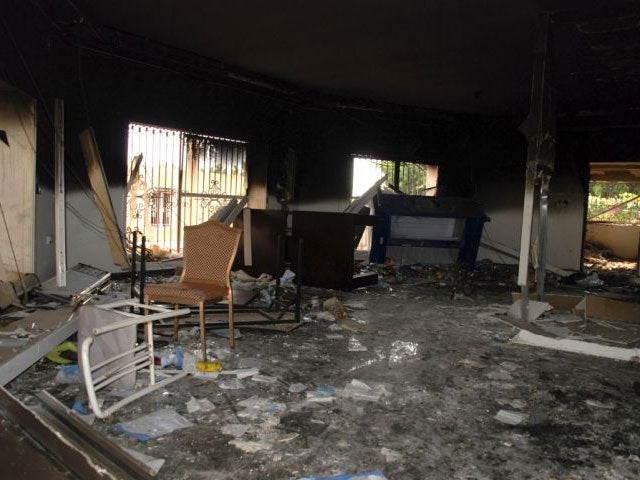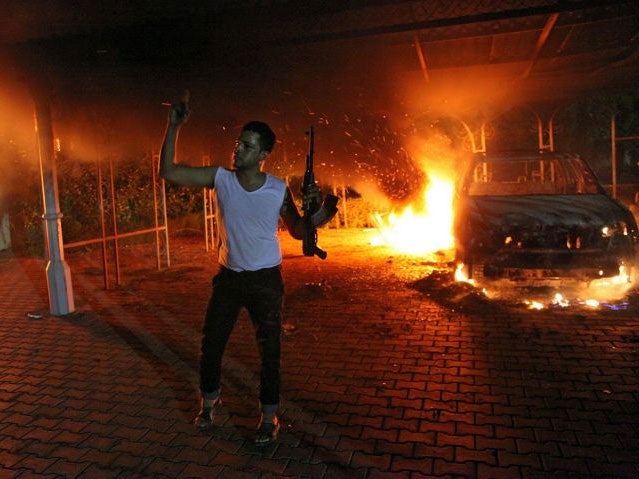Benghazi attack suspect Ahmed Abu Khatallah captured by US forces in secret raid
President Obama said the capture shows the US will "do whatever it takes" to bring justice to those who harm Americans

US forces have captured a Libyan militant accused of carrying out a deadly attack on the US diplomatic compound in Benghazi, Libya, according to the Pentagon.
Ahmed Abu Khattallah, a senior leader of the Benghazi branch of the terrorist group Ansar al-Sharia, is the first person to be detained in connection with the 2012 attack, The Washington post reported.
Ambassador Christopher Stevens was among the four Americans who died after a group of militants set fire to the US diplomatic mission in Benghazi.
Abu Khatallah will now be charged and prosecuted through the US court system, and would not be sent to the prison for suspected al-Qa'ida militants in Guantanamo, Cuba, according a US official.

He is being held in a secret “secure location outside Libya” after he was apprehended on Sunday by the US military working in co-operation with law enforcement personnel, according to Pentagon press secretary Rear Admiral John Kirby.
But a US official, speaking on condition of anonymity, said Khatallah was being held aboard an American ship after he was grabbed on the outskirts of Benghazi.
No civilians were killed in during the operation, and all of the Americans involved have safely departed Libya, Kirby confirmed.
Court documents previously sealed until news of Khatallah's capture became public on Tuesday reveal that he is charged with killing a person; supporting terrorists; and using a firearm during and in relation to a crime of violence.
On Tuesday, US President Barack Obama said in a statement that the country's authorities will continue to track down those responsible for the attacks, he said.
"Since the deadly attacks on our facilities in Benghazi, I have made it a priority to find and bring to justice those responsible for the deaths of four brave Americans," President Obama said.
He continued: "The fact that (Khatallah) is now in US custody is a testament to the painstaking efforts of our military, law enforcement, and intelligence personnel. Because of their courage and professionalism, this individual will now face the full weight of the American justice system."
He added that the US must support the Libyan people as they work to build democracy, as the country has remained unstable since the overthrow of Colonel Muammar Gaddafi in 2011.
The Obama administration has come under intense criticism from opposition Republicans for being unable to apprehend those responsible for the attack, and accused then-Secretary of State Hillary Clinton of failing to take adequate steps to ensure the safety of American diplomatic personnel.
White House spokesman Jay Carney told reporters traveling with President Obama on Tuesday: “We have made it clear since that cowardly attack on our facility that we would go to any lengths to find, apprehend and bring to justice those who perpetrated it."
”The capture of Abu Khatallah is not the end of that effort, but it marks an important milestone," he added.

Carney said the suspect was a key figure in the 2012 attacks, but referred other questions to the Department of Defense.
Last year, the US filed charges against Khattala and a number of others in a sealed complaint filed in US District Court in Washington, but Sunday’s detention was the first since the 2012 attack.
The Libyan government had no immediate comment on announcement and it was unclear whether Washington had notified Libyan officials before carrying out the operation.
The Pentagon said it did notify the Libyan government of the operation, but did not disclose whether this was before or after the capture.
It was the second time the administration has said US special operations forces have gone into Libya to detain a militant, when a U.S. Army Delta Force team captured al Qaeda suspect Abu Anas al-Liby, in Tripoli in October 2013.
Al-Liby was later charged in a US federal court in New York in connection with the 1998 bombing of the US Embassy in Kenya, which killed more than 200 people.
The detention comes as Libya has broken into virtual fiefdoms ruled by militias since 2011. Earlier in June, a suicide bomber tried and failed to kill the Libyan General Khalifa Hifter in Tripoli, who is trying to neutralise the influence of the militias in the country.
Following the attack, unidentified gunmen fired a rocket-propelled grenade at the office of the new Libyan Prime Minister, Ahmed Maiteeq, one of his aides said, but nobody was hurt.
Additional reporting by agencies
Join our commenting forum
Join thought-provoking conversations, follow other Independent readers and see their replies
Comments
Bookmark popover
Removed from bookmarks